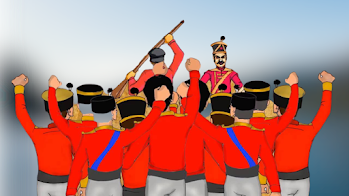Rebellion of 1857
The Indian Rebellion of 1857, also known as the Indian Mutiny or the First War of Independence, was a significant armed uprising against British colonial rule in India. It began on May 10, 1857, in the town of Meerut, and quickly spread throughout northern and central India.
Causes of the Rebellion:
- The extension of Indian territories by the British East India Company
- Economic exploitation of Indian farmers, artisans and merchants
- The British policy of Doctrine of Lapse, which allowed the British to annex Indian princely states that didn't have male heirs
- The introduction of the Enfield rifle, which used cartridges that were rumored to be greased with pig and cow fat, which was against the religious beliefs of Hindu and Muslim soldiers in the British Indian Army
Course of the Rebellion:
The rebellion was initially led by Indian soldiers, or sepoys, of the British Indian Army, but it soon spread to civilians, including peasants, landowners, and religious leaders. Many Indian rulers and nobles also joined the rebellion, seeking to regain their former power and influence.
The rebels managed to seize control of many cities and towns, including Delhi, Lucknow, Kanpur, and Jhansi, and established their own governments. However, the British quickly mobilized their forces and launched a brutal campaign to suppress the rebellion. The fighting was often fierce and brutal, with both sides committing atrocities against civilians.
British response:
The British government dispatched troops and reinforcements from Britain and other colonies to put down the rebellion. The East India Company also employed mercenaries from various parts of the world, including Africa and the Middle East, to fight the rebels.
The British military campaign was marked by a series of brutal massacres of Indian civilians and rebels, including the massacre of Indian prisoners at Bibighar in Kanpur, and the sack of Delhi, in which thousands of civilians were killed.
Outcome of the Rebellion:
The rebellion was ultimately unsuccessful in its goal of driving the British out of India. The British government took direct control of India from the East India Company in 1858, and the country remained under British rule until 1947.
The rebellion, however, had a significant impact on Indian society and politics. It marked the beginning of a broader struggle against British colonial rule and inspired subsequent generations of Indian freedom fighters. It also led to a number of reforms, including the abolition of the East India Company and the introduction of greater Indian representation in colonial governance.

